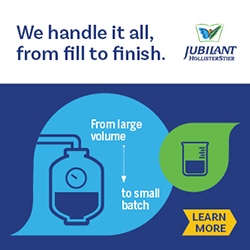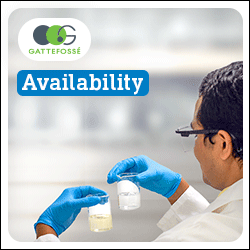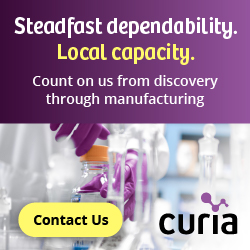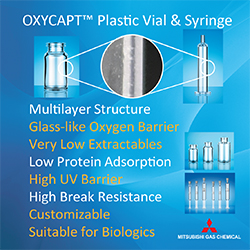Veru Receives FDA Agreement to Advance VERU-111 Into Phase 3 Study
Veru Inc. recently announced the FDA agreed in an End of Phase 2 meeting, to advance VERU-111 into a Phase 3 registration clinical study based on the clinically meaningful benefits observed with VERU-111 treatment in the recently completed double-blind, randomized, placebo-controlled Phase 2 clinical trial evaluating oral, once-a-day dosing of VERU-111 versus placebo in approximately 40 hospitalized COVID-19 patients at high risk for ARDS. The Phase 2 trial demonstrated clinically meaningful reductions in relevant endpoints, including respiratory failure, patient mortality, days in the ICU and days on mechanical ventilation. VERU-111 has the potential for two-pronged action against COVID-19 as an antiviral and an anti-inflammatory agent which is supported by positive Phase 2 clinical study results.
“We are very pleased with the outcome of the FDA meeting. FDA was extremely collaborative and thought that the clinical data from the Phase 2 were promising and suggest a potential clinically meaningful benefit for the use of VERU-111 in hospitalized high risk COVID-19 patients. Also, the FDA agreed that VERU-111 warrants further development in a Phase 3 program,” said Mitchell Steiner, MD, Chairman, President and Chief Executive Officer of Veru. “Due to the urgency of the global pandemic and need for more effective treatment options for patients, we remain duty-bound to pursue this indication, even though it has not been the primary focus of Veru. We have the resources to conduct a Phase 3 trial without impacting our cancer drugs’ clinical development.”
We have met with and will seek funding from The Biomedical Advanced Research and Development Authority of the US Department of Health and Human Services (BARDA) as well as other agencies to fund the estimated amount of commercial drug to supply the needs of the US population, assuming confirmatory positive Phase 3 clinical results and FDA approval.
With a similar trial design to the completed positive Phase 2 study, the Phase 3 clinical registration trial design will evaluate daily oral doses of VERU-111 versus placebo with the primary efficacy endpoint of proportion of patients alive at Day 29. It is expected that the Phase 3 clinical trial will be conducted in approximately 400 hospitalized patients who have SARS-CoV-2 virus infection and are at high risk for ARDS at a 2:1 ratio between the VERU-111 (approximately 267 patients) and placebo (approximately 133 patients) treated groups.
The company has enough clinical drug supply on hand to complete the Phase 3 clinical study. The Phase 3 clinical trial is expected to commence in April 2021 and clinical results are expected by the fourth quarter of calendar year 2021.
Veru conducted a double-blind, randomized, placebo-controlled Phase 2 clinical trial evaluating oral, once-a-day dosing of VERU-111 18mg versus placebo in approximately 40 hospitalized COVID-19 patients who were at high risk for ARDS. The trial was conducted in five sites across the United States. Patients hospitalized with documented evidence of COVID-19 infection and at high risk for ARDS were enrolled. Subjects received an 18mg dose of VERU-111 or placebo, as well as standard of care for 21 days or until released from hospital. The primary efficacy endpoint was the proportion of patients alive without respiratory failure at Day 29.
For the primary endpoint in a modified intent-to-treat (MITT) population, VERU-111 treatment compared to placebo had a statistically significant and clinically meaningful reduction in the proportion of patients who are treatment failures (dead or alive with respiratory failure) with a 30% treatment failure rate in the placebo group (n=20) compared to 5.6% in the VERU-111 treated group (n=18) at Day 29. This represents an 81% relative reduction in the VERU-111 treatment failures and showed statistical significance with p=0.05.
For secondary endpoints: in the Intent to Treat (ITT) population, VERU-111 reduced the proportion of patients who died on study from 30% (6/20) in the placebo group to 5.3% (1/19) in the VERU-111 treated group (p=0.044). This is an 82% relative reduction in mortality in the VERU-111 treated group. In an MITT population, VERU-111 showed a statistically significant and clinically meaningful reduction in days in ICU (VERU-111 patients at 3.00 ± 7.16 days versus placebo 9.55 ± 11.54; p=0.04). VERU-111 reduced the days on mechanical ventilation from an average of 5.4 days in the placebo group to 1.6 days in the VERU-111 treated group. VERU-111 was tolerated with a good safety profile.
During the study, the standard of care included treatment with remdesivir and/or dexamethasone under an Emergency Use Authorization. The use of remdesivir and dexamethasone did not have a significant effect on patient outcomes in the study. A subgroup analysis of patients that received standard of care was conducted. There were six patients in the entire study that did not receive standard of care of either remdesivir or dexamethasone (four in the VERU-111 treated group and two in the placebo group). In patients that did not receive the standard of care, VERU-111 treatment resulted in a statistically significant reduction in days in ICU (VERU-111 1.43 ± 3.96 days versus placebo 8.83 ± 13.07 days; p=0.024) and days on mechanical ventilation (VERU-111 zero days versus placebo 6.00 ± 10.57 days; p=0.0427). In the VERU-111 group on standard of care, no patient required mechanical ventilation on study.
Veru Inc. is an oncology biopharmaceutical company with a focus on developing novel medicines for the management of prostate cancer and breast cancer. The Veru prostate cancer pipeline includes VERU-111, VERU-100, and Zuclomiphene citrate. VERU-111 is an oral, first-in-class, new chemical entity that targets, crosslinks, and disrupts alpha and beta tubulin subunits of microtubules for the treatment of metastatic castration and androgen receptor resistant prostate cancer. VERU-100 is a novel, proprietary peptide formulation designed to address the current limitations of commercially available androgen deprivation therapies (ADT) for advanced prostate cancer. Zuclomiphene citrate is an oral nonsteroidal estrogen receptor agonist being developed to treat hot flashes, a common side effect caused by ADT in men with advanced prostate cancer. The Veru breast cancer pipeline includes enobosarm for AR+/ER+/HER2- metastatic breast cancer and VERU-111 for taxane resistant metastatic triple negative breast cancer. Enobosarm is an oral, first-in-class, new chemical entity, selective androgen receptor agonist that targets and activates the androgen receptor in AR+/ER+/HER2- metastatic breast cancer without unwanted masculinizing side effects. VERU-111 is also being advanced into Phase 3 for the treatment of hospitalized patients with COVID-19 who are at high risk for acute respiratory distress syndrome.
The company’s Sexual Health Business commercial product is the FC2 Female Condom/FC2 Internal Condom (FC2), an FDA-approved product for the dual protection against unintended pregnancy and the transmission of sexually transmitted infections. The Company’s Female Health Company Division markets and sells FC2 commercially and in the public health sector both in the US and globally. In the US, FC2 is available by prescription through multiple third-party telemedicine and internet pharmacy providers and retail pharmacies. In the global public health sector, the Company markets FC2 to entities, including ministries of health, government health agencies, UN agencies, nonprofit organizations and commercial partners, that work to support and improve the lives, health and well-being of women around the world. An NDA was submitted in February 2021 for TADFIN (tadalafil 5 mg and finasteride 5 mg) capsule for the administration of tadalafil 5 mg and finasteride 5 mg combination formulation dosed daily for benign prostatic hyperplasia (BPH). Tadalafil (CIALIS) is currently approved for treatment of BPH and erectile dysfunction and finasteride is currently approved for treatment of BPH (finasteride 5 mg PROSCAR) and male pattern hair loss (finasteride 1 mg PROPECIA). If approved, revenues from TADFIN (tadalafil 5 mg and finasteride 5 mg) capsule and the current revenues from the FC2 business will be combined in our sexual health commercial business. For more information, visit www.verupharma.com.
Total Page Views: 4321














